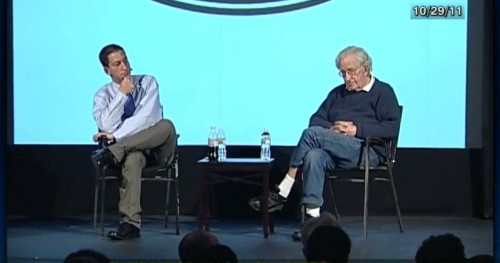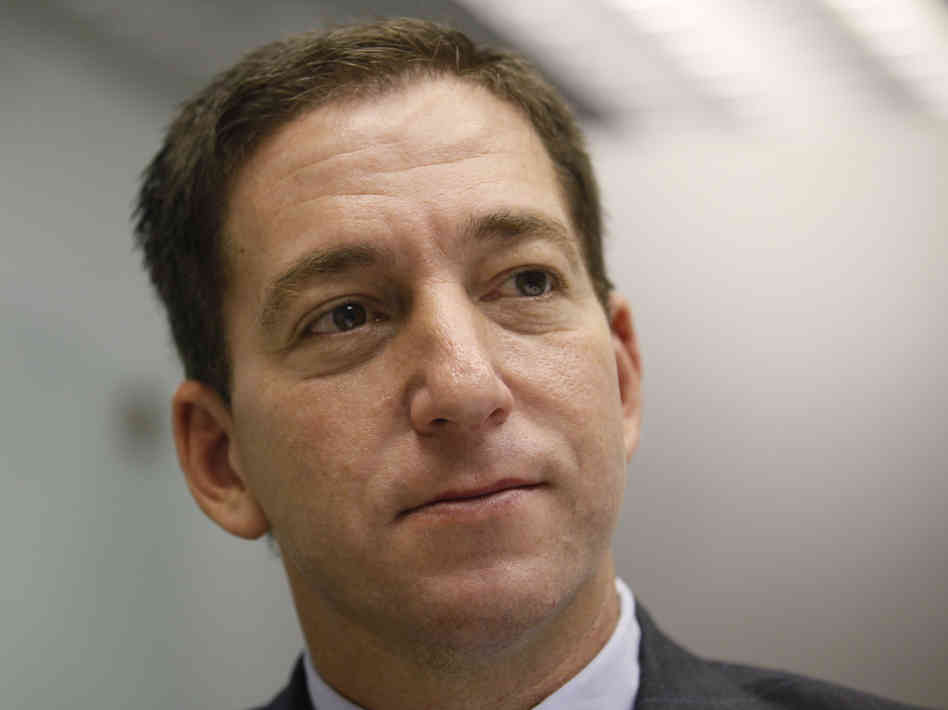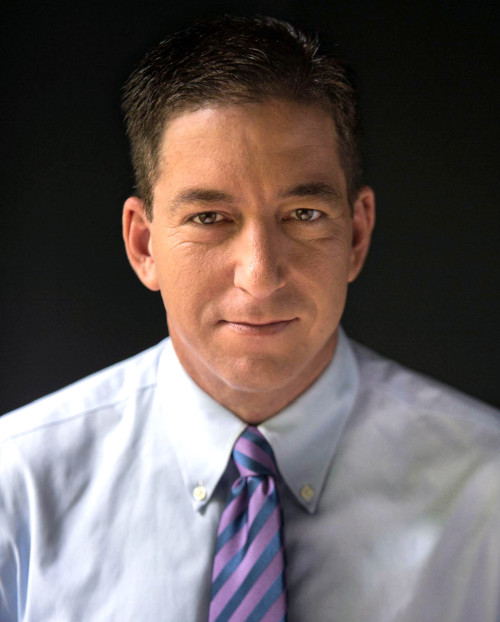Guillaume Durocher
Occidental Observer
September 3, 2015
I write this piece with a heavy heart. As I have previously written, I have long held a great deal of respect for the lawyer, constitutional expert, and brilliant polemicist Glenn Greenwald. Seen from Europe, his articulate defense of civil liberties and a peaceful foreign policy presented a tantalizing alternative of another America to that of the swaggering, neoconservative-dominated administration of George W. Bush. But, as time goes on, the evidence mounts that Greenwald is marked by ethnic biases, conscious or not, which lead him to engage in vicious attacks against Anglo-American identities and, most seriously, to condone illegal immigration that is enormously threatening to the traditional peoples of the West.
Greenwald is an interesting writer and, I believe, is still useful in certain respects. He began his career defending the free speech rights of White Nationalists pro bono and, to this day, his defense of free speech and crusade against the Surveillance State benefit us all.
Greenwald’s trademark writing style is herem or excommunication: The uncompromising, vicious, and indeed sometimes excessive denunciation of hypocrites, liars, and violators of stated moral, legal, or constitutional principles. Unlike the typical Talmudist however, Greenwald will found his sermon upon a powerful and meticulously-detailed case — typically citing Western legal principles as much as the opponent’s previous incriminating statements.
However, the trouble is in Greenwald’s selectivity in targets and his utterly misleading depiction of who wields power in the West. Greenwald, as a rule, has been admirably consistent in condemning both Republicans and Democrats for violations of the law, such as illegal wiretapping under Bush, or the vast Surveillance State and aggression against Libya under Barack Obama. Greenwald has even stuck by perceived constitutional principle when this radically clashed with his liberal friends, namely defending the Citizens United interpretation of the First Amendment (which was perceived as giving “unlimited free speech to corporations”).
But there is one subject on which Greenwald’s usual fury is completely absent: Immigration. Uncharacteristically, Greenwald has yet to write on Obama’s executive amnesty decision refusing to enforce federal law and allowing millions of illegal aliens to remain in the country, even as courts have found the decision unconstitutional, whereas he has made strong attacks against executive overreach — one of his trademark issues.
On the contrary, in a recent hit piece against presidential candidate Donald Trump, Greenwald apparently for the first time expends his righteous indignation defending the lawlessness of illegal immigration and the refusal to enforce the nation’s laws. It’s all there:
The Republican presidential candidate leading every poll, Donald Trump, recently unveiled his plan to forcibly deport all 11 million human beings residing in the U.S. without proper documentation, roughly half of whom have children born in the U.S. (and who are thus American citizens). As George Will noted last week, “Trump’s roundup would be about 94 times larger than the wartime internment of 117,000 persons of Japanese descent.” It would require a massive expansion of the most tyrannical police state powers far beyond their already immense post-9/11 explosion. And that’s to say nothing of the incomparably ugly sentiments that Trump’s advocacy of this plan, far before its implementation, is predictably unleashing.
You’ve got to love the euphemistic tear-jerking (“human beings . . . without the proper documentation” with children, as opposed to lawbreakers), the completely misleading comparison to wartime Japanese internment, the hyperbole, his pretense to occupying the moral high ground (“ugly sentiments”) without even discussing the legitimate financial, political, and ethnic interests of Americans, and the implicit call to self-censorship against opposition to immigration or pointing out Hispanic crime.
Greenwald goes on to defend the anti-American, Hispanic ethnic activist and Univision TV man Jorge Ramos’ recent heckling of Trump (which he terms “commit[ting] journalism”) and condemning the candidate’s move to physically remove him. There follows more tear-jerking as Greenwald quotes Ramos saying: “This is personal. . . . [Trump]’s talking about our parents, our friends, our kids and our babies.” Greenwald goes on to refer to Trump as “a dangerous, powerful billionaire-demagogue spouting hatemongering nonsense about mass deportation.”
On the crucial issue of immigration — an issue critical to the future of White America and indeed to the United States in general as any kind of coherent nation — Greenwald the righteous constitutional scholar is explicitly siding with lawlessness. The interests of America, much less White America, never enter his mind.
Greenwald vs. “Our Tribalism”
I have long been disturbed by Greenwald’s wider gratuitous attacks against traditional American and WASP culture. He has attacked “religious fanaticism” among Evangelical Christians as “a huge factor” driving America’s support for Israel, ludicrously suggesting that the Jewish factor is slight because Jews compose only 1.4 percent of the American population. Of course, what matters is not Jewish votes, but ample Jewish-Zionist money funding both political parties, as even mainstream Jews like Matthew Yglesias and the highly-useful Philip Weiss have documented. Greenwald of course does not mention Jewish ownership of Hollywood or of so much of the mainstream media in building support for Israel. He confuses cause and effect. The fact is that the brainwashed, dull-witted pro-Israel goyim masses are of little importance compared with the money and media-cultural influence of Israel-obsessed Jewish oligarchs like Sheldon Adelson and Haim Saban.
Greenwald has written somewhat inanely on the semantics of terrorism committed by the misguided White Nationalist Dylan Storm Roof as opposed to Islamist terrorism. He has written derisively of the “Puritanical” — another traditional White American culture — response to the leaking of personal details of members of the Jewish-founded adultery website Ashley Madison. Now I am no Puritan and I think people should have some privacy for their inevitable moral weaknesses. But, in effect, Greenwald’s argument contests the very principle of any social shaming of bad behavior, encouraging the kind of social atomization which leads to maladaptive behavior, particular in the lower half of the IQ bell curve.
One of his books, Great American Hypocrites, is a powerful indictment of the hypocrisy of the dog-whistling Republican establishment, but is also a wider attack on the (overwhelmingly White) subculture of Christian, rural, Red America — the traditional bogeyman of Jewish intellectuals and their abhorrence of populism among White Americans.
Most misleading however has been Greenwald’s repeated use of the word “tribalism” to denounce Western imperialism in the Middle East:
While the leading lights of the West love to celebrate themselves as beacons of civilized, progressive rationality, their overriding mentality is just the crassest and most primitive form of tribalism: when Our Side does it, it is right, and when Their Side does it, it is wrong. No matter the esoteric finery in which it drapes itself, that is the primitive, banal formulation that lies at the heart of the vast, vast majority of foreign policy discourse in the West. So often, those who fancy themselves brave warriors for rationality and advancement by demonizing Islam are just rank tribalists whose own national, religious and cultural loyalties are served by doing so.
The argument then is one of condemnation of Western chauvinism. But does Greenwald really think Western nationalists caused the wars in the Middle East? Greenwald is specifically referring to the supposed “tribalism” of the loathsome former British Prime Minister Tony Blair. But that begs the question: What tribe does Tony Blair, or for that matter George Bush or Barack Obama, serve? They certainly don’t serve the interests of Whites.
There’s a very simple litmus test for whether “tribalist” White America really ran the United States: There would be far less immigration and European-Americans would not be on the verge of becoming a vulnerable minority, against their will, in the very country which their ancestors founded for them. But if the White majority does not rule America, well then, who does? The short answer is a deracinated corporate oligarchy which is about one third Jewish and whose Jewish component is unbelievably over-represented in the critical choke points of influence: the news and entertainment media, the financing of political campaigns, and presidential administrations generally. That little clique forms the “tribalists” which Blair, Bush, and Obama have to pander to, certainly not Western publics in general.
Chomsky and Greenwald: A Shared Ethnic Blind Spot

I am struck at the similarity between Greenwald’s conceit and that of the world’s favorite intellectual pseudo-dissident/New York Times #1 intellectual, Noam Chomsky. Greenwald has frequently quoted Chomsky’s famous moral dictum:
My own concern is primarily the terror and violence carried out by my own state, for two reasons. For one thing, because it happens to be the larger component of international violence. But also for a much more important reason than that; namely, I can do something about it. So even if the U.S. was responsible for 2 percent of the violence in the world instead of the majority of it, it would be that 2 percent I would be primarily responsible for. And that is a simple ethical judgment. That is, the ethical value of one’s actions depends on their anticipated and predictable consequences. It is very easy to denounce the atrocities of someone else. That has about as much ethical value as denouncing atrocities that took place in the 18th century.
This is sound moral reasoning. But there is a problem: It appears to consider the U.S. as a homogeneous mass equally “responsible” for the crimes of the U.S. government. “Us” is the U.S. as a whole. But “us” could just as easily be one’s economic class or ethnic community. Chomsky and Greenwald never think of themselves as part of an astonishingly influential Jewish elite which, concerning immigration, multiculturalism, and policy towards Israel, has undeniably had a critical impact. In the case of Chomsky, this ethnic blind spot is so great that he has even denied the impact of the copiously-documented Israel lobby, instead ludicrously arguing that U.S. support for Israel is grounded in imperial self-interest.
Chomsky and Greenwald spread the blame for the evils of American foreign policy over White America as a whole, rather than restrict it to the particular ethnic and political elites responsible. There is vituperative denunciation of “Western tribalism,” “Evangelicals,” and “our” selfishness — which may all be factors — and yet complete silence on the elephant in the room that is Jewish-Zionist money and media-cultural bias. This is a blind spot Chomsky and Greenwald seem to share, even though both men are indeed highly critical of Israel.
Greenwald’s Foundations: A Jewish milieu and Nuremberg
I can only speculate as to Greenwald’s psychological motivations, which may be unknown and unconscious even to him. He is certainly in the long and destructive tradition of Jewish intellectuals of the left, and he may well be driven by the same ethnic resentments of so many Jewish intellectuals against the traditional peoples and culture of the West, combined with a bit more honesty about Israeli brutality. Certainly the uncompromising emotional intensity of his attacks against opponents in general and European-American culture in particular are characteristic.
Greenwald’s power networks are significantly, though not entirely, Jewish. He has taken some risks in taking on the mainstream liberal, conservative, and neoconservative establishments, and has needed powerful friends to do this successfully. His rise to global fame saw many steps: joining the significantly-Jewish liberal website Salon, speaking before far-left Socialist gatherings and writing for the Libertarian CATO Institute (founded by the Koch brothers and Murray Rothbard, now run by Chairman Robert Levy and Vice President David Boaz . . .), joining the left-wing British Guardian, working generally closely with the Jewish-led ACLU, before finally joining Franco-Iranian tech oligarch Pierre Omidyar following the coup that was his reception of Edward Snowden’s NSA leak.
The lawyers working with Greenwald in the Oscar-crowned documentary CitizenFour are overwhelmingly Jewish. In one article on Obama’s failure to shut down Guantánamo Bay, Greenwald exclusively cites Jews in support of his position (Ken Roth, Ben Wizner, Russ Feingold, Bernie Sanders . . .). I mention these examples to suggest that he works in a substantially Jewish civil liberties milieu. Such an environment would be conducive to the development of ethnic biases against non-Jews and, in particular, against WASPs and traditional American culture.
On a philosophical level, Greenwald’s great weakness is in a certain selectivity in his fundamental legal foundations. Greenwald cites essentially two sources in defining the legitimate use of power: The U.S. Constitution and the Nuremberg Military Tribunal. On the Constitution, Greenwald conveniently forgets that the Founding Fathers, whom he loves to quote, conceived of their system of government as functioning only in an ethno-culturally homogeneous European-derived nation (see Benjamin Franklin, John Jay, Thomas Jefferson, James Madison, Abraham Lincoln . . .) and that indeed many were already hostile to the misanthropic aspects of Jewish culture.
Greenwald’s citing of Nuremberg is also problematic. Admittedly, he does so because the current Western regimes base their legitimacy on Nuremberg, which he then uses to condemn the “wars of aggression” being waged by Western governments in the Middle East. This is a noble argument. But, more fundamentally, Nuremberg was an illegitimate example of “victor’s justice” (something recognized by many leading Americans at the time) which has since been used to demonize any attempt by Western peoples to defend their legitimate ethnic interests by association with the Holocaust.
Greenwald appears to have gone for this narrative hook, line, and sinker. Indeed, he frequently mocks all symbols of and appeals to patriotism and national identity (even finding puerile fun in mocking the British monarchy’s decorum). As he wrote on a British minister’s (admittedly dubious) defense of new censorship legislation:
[S]he evades the question completely, repeatedly invoking creepy slogans about the need to stop those who seek to “undermine Our British Values” and, instead, ensure “we are together as one society, One Nation” (I personally believe this was all more lyrical in its original German).
I happen to be a strong advocate of free speech. But why does Greenwald seem to think that an elementary a statement as “we are together as one society, one nation” is “creepy” or Nazi-esque? Is Greenwald opposed to all sense of nationhood and political community?
I doubt Greenwald will read this article but, if he does, I hope he understands it as a good-faith invitation to reflection and self-criticism, as opposed to a personal attack. But on the off chance that he does read it: Glenn, read a bit of Mondoweiss, take to heart the politically incorrect writings of the Founding Fathers, be a bit more critical of the weaponized “Nuremberg narrative,” and, most elementary of all, defend the law you claim to serve concerning immigration!
You also claim to serve justice and the weak. Well, let me be so bold as to suggest that, today, the traditional peoples of the West are in a position of weakness and a supreme injustice is being committed against them: The handing over of their homelands, against their will and their existential security, to other peoples with historic grudges against them. Let all men of good will fight for the righteous cause that is the European peoples’ right to life.

